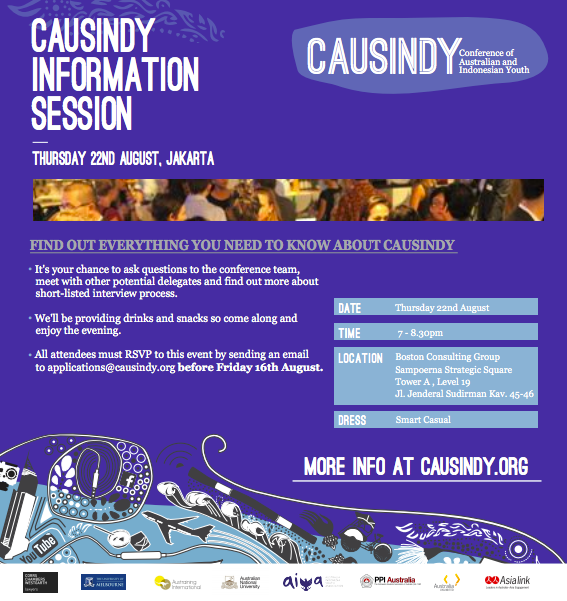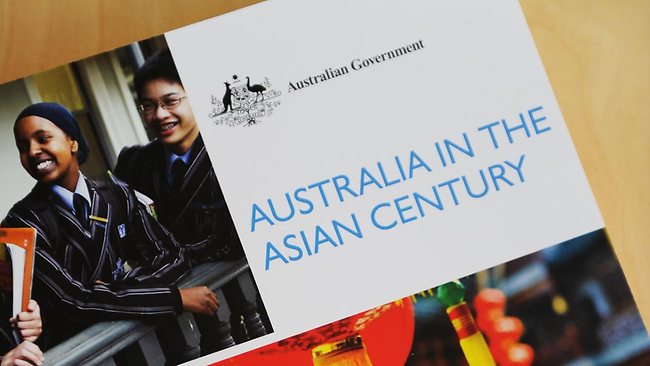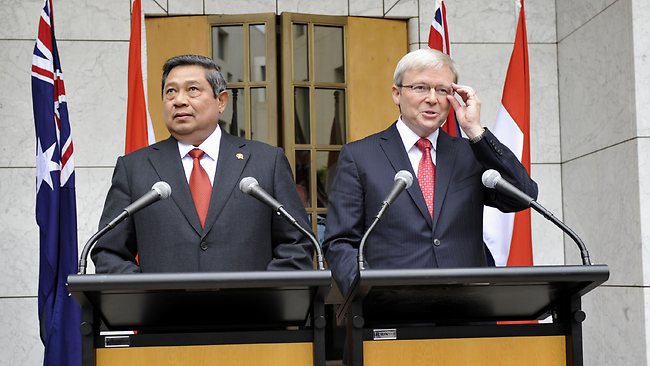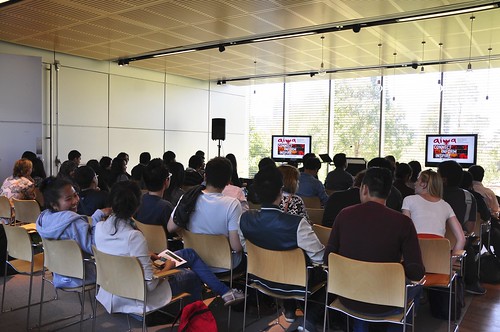In this new series, we’re speaking to young Australians and Indonesians who have had personal experience in the bilateral relationship. For our first post, we spoke to Clare Price, a young Australian with a background in communications and media.
Do you know someone we should speak to? Let us know through our Facebook or Twitter pages!
What is your background with Indonesia?
Sebenarnya hubungan saya dengan Indonesia terjadi lewat Ibu saya. Dia bekerja sebagai guru bahasa Indonesia sejak saya kecil, dan dari awal ibu menginginkan saya belajar bahasa Indonesia. Saya belajar bahasa Indonesia di SMP dan SMA kemudian di universitas juga. Pertama kali saya ke Indonesia adalah pada saat saya berumur 10 tahun, saya ke Bali dengan ibu saya, dan tentu saja saya jatuh cinta dengan pulau Bali. Ketika saya umur 15 tahun saya mengunjungi Sulewesi Selatan juga.
My mum introduced me to Indonesia. She worked as an Indonesian teacher, and encouraged me to study the language. I studied Indonesian in primary, secondary school, and at university. I visited Indonesia for the first time when I was 10, to Bali, and was blown away. I also visited South Sulawesi at 15.
Your blog gives an amazing snapshot of life in Jakarta – and some of the most interesting are the everyday observations. What were the highlights?
Ada banyak hal sehari-hari di Indonesia yang menarik. Misalnya, kegiatan-kegiatan yang terjadi di setiap tepi jalan di Indonesia yaitu kaki lima yang jual makanan yang eksotik, dan ribuan orang yang habiskan waktu di tepi jalan, nonkrong namanya. Ketika saya tinggal di Jakarta ada seekor penyu yang besar sekali yang tinggal di dalam pasar ikan di ujung gang saya. Penyunya suka makan pepaya. Hal lain yang menarik adalah masyarakat kreatif di Jakarta yang besar, selalu ada eksibisi seni,foto dan band-band lokal yang main juga banyak orang-orang yang ingin berbagi ide-ide serta kreasi dalam dunianya.
In Indonesia, there are so many interesting things happening in everyday life: activities on the side of the road, kaki lima and people sitting and chatting with friends everywhere. In Jakarta, a huge turtle lived in the fish market at the end of my street, I used to feed it papaya. Another interesting aspect of life in Jakarta is the city’s huge creative community – there’s always an art or photography exhibition opening or local band playing.
How do you see people-to-people links between Australia and Indonesia growing?
Hubungannya antara orang Australia dan orang Indonesia akan terus tumbuh di masa depan, sebenarnya pada saat ini hubungannya sudah kuat sekali. Indonesia dan Australia adalah tetangga, dan karena itu, seharusnya bekerja sama dan berbagi pengalaman-pengalaman terkait perdagangan, pembangunan, politik dan pendidikan.
The people-to-people links between Australian and Indonesian will continue grow – building on what’s already been established. Indonesia and Australia are neighbours, and will always have trade, development, politics and education links.
What role do you think aid plays in shaping Indonesia’s perceptions of Australia?
Pasti program bantuan dari Australia akan membentuk persepsi orang Indonesia tentang Australia. Juga hal lain seperti budaya, politik dan olahraga membentuk persepsi tersebut. Apa yang paling penting adalah program bantuan Australia di Indonesia adalah program yang berhasil, yang mengurangi kemiskinan, memperkuat pelayanan-pelayanan kesehatan, membangun sekolah-sekolah di daerah yang terpencil dan menghentikan serta mencegah penyebaran penyakit seperti HIV/AIDS.
Absolutely Australia’s aid program affects Indonesia’s perception of Australia – along with cultural differences, politics, and sport. What’s most important is that Australia’s aid program in Indonesia continues to reduce poverty, strengthen health services, build schools and prevent the spread of diseases such as HIV/AIDS.
Indonesia is developing rapidly: where do you see Australia’s aid program in 10 years’ time?
Mudah-mudahan Indonesia tidak akan memerlukan program bantuan Australia di sepuluh tahun ke depan. Dan saya pikir AusAID pasti punya harapan yang sama. AusAID mau mendukung Pemerintah Indonesia sekarang dengan mengurangi tingkat kemiskinan di seluruh Indonesia, tetapi AusAID juga punya harapan besar bahwa Indonesia menjadi negara yang lebih daripada negara berkembang sehinggah tidak memerlukan program bantuan lagi.
Those working in aid hope to work themselves out of a job! The aid community works with the goal that Indonesia won’t need Australian aid in 10 years. AusAID is willing to support the Indonesian government in its efforts to reduce poverty, but as Indonesia is growing at such a rapid pace, aid wont always be required.






















